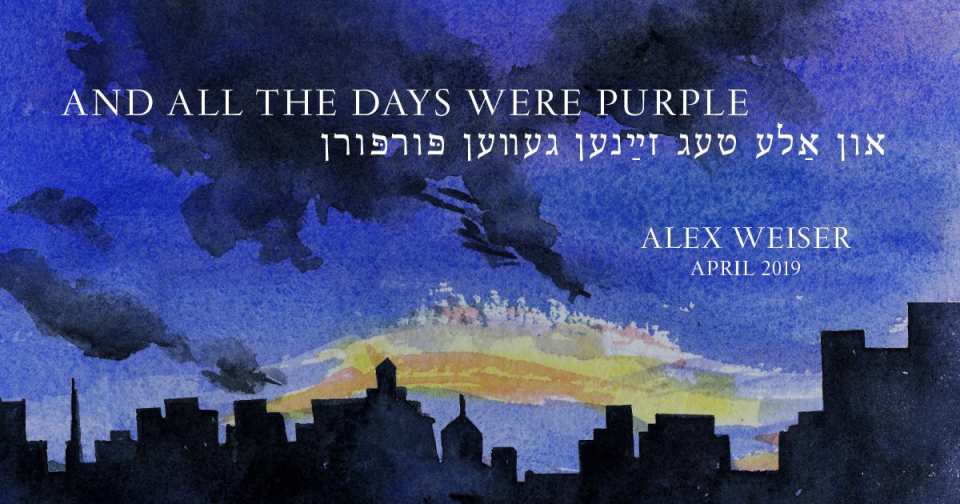A Homecoming to a Jewish World I Never Knew Existed

by ALEX WEISER
When I started working at YIVO in February 2016, I didn’t know Yiddish. Sure, Yiddish was the language that my family had spoken in the old country, but here in the golden land only a smattering of words and phrases remained in our vernacular. As I began learning Yiddish at YIVO and becoming acquainted with the wider world of Jewish studies, it felt like a homecoming. Not to the bored evenings I spent as a child at Hebrew school, nor to the folksy and familiar world of Fiddler on the Roof and Bar Mitzvah music. It was a homecoming to a Jewish world that I never quite knew existed. A world in which a simple plum can be the center of a profound poem about the power of art. A world in which the language I was told my grandparents’ parents used to tell their secrets is also a language of erotic poetry. A world in which history, language, and culture can unite Jews across time, space, and religious and political divisions.
As a composer, the music in YIVO’s vast collection was of particular interest to me. As I started curating concerts at YIVO, reading books about its holdings, and searching through its archives, I discovered so many musical treasures: a popular song about the pleasure of a family visit to Coney Island, a song by a survivor lamenting that the Messiah is already too late, a whole slew of songs recasting the Song of Songs onto melodramatic love stories on Second Avenue…
One thing in particular that I encountered which really fascinated me was a movement in classical music that I had never learned about in my many years and two degrees studying composition. In 1908, a group of composers from the St. Petersburg Conservatory — including students of Rimsky-Korsakov — founded a musical organization dedicated to the pursuit of a particularly Jewish classical music. Just as Bela Bartók worked as both an ethnomusicologist and a composer, collecting folk songs and then infusing his music with them, so too did the composers of this organization and a wider community around it. They supported the collection and study of Jewish folk songs, and wrote, published, and performed classical music which sought to craft a new style by using these melodies or taking inspiration from their sensibility. While many of their pieces engage directly with melodies of Jewish folk music, others endeavor to be Jewish by telling stories taken from Jewish religious texts or history, and yet others celebrate more abstract and unexpected corners of the Jewish literary canon.
I found this fascinating and inspiring. Here were composers grappling with questions of what it means to be a Jew and a composer, and offering a variety of deeply felt answers. This, and the wider world of YIVO, reminded me with renewed intensity of the amazing diversity of what Jewishness can encompass, and inspired me to tackle the question for myself in my own music: what does being Jewish mean to me? How can I find my own place as a Jewish composer within this vast spectrum?
My new album, and all the days were purple, explores the question of trying to find meaning amidst life’s transience and tumult, with secular Jewish poetry as a departure point. In the opening song, the Yiddish language poem by Anna Margolin surmises that it is only in the always looming specter of death that the joy of the quotidien comes into focus. In another Anna Margolin poem, set later on the album, this interplay between life and death is said to bring us closest to godliness. For me these poems, and all of the songs on the album, are like secular prayers.
I think that framing this search for meaning within a Jewish language and with Jewish themes adds a tremendous power. It grounds a modern encounter with these eternal questions within a rich lineage of struggling with God - some of which I embrace, some of which I question, all of which I am proud to be connected to.
Join me at YIVO (15 West 16th Street, New York, NY) on Tuesday, April 9 at 7:00pm for the launch of and all the days were purple.
Alex Weiser in conversation with Eddy Portnoy and Annie Gosfield.
Alex Weiser is YIVO’s Director of Public Programs.




